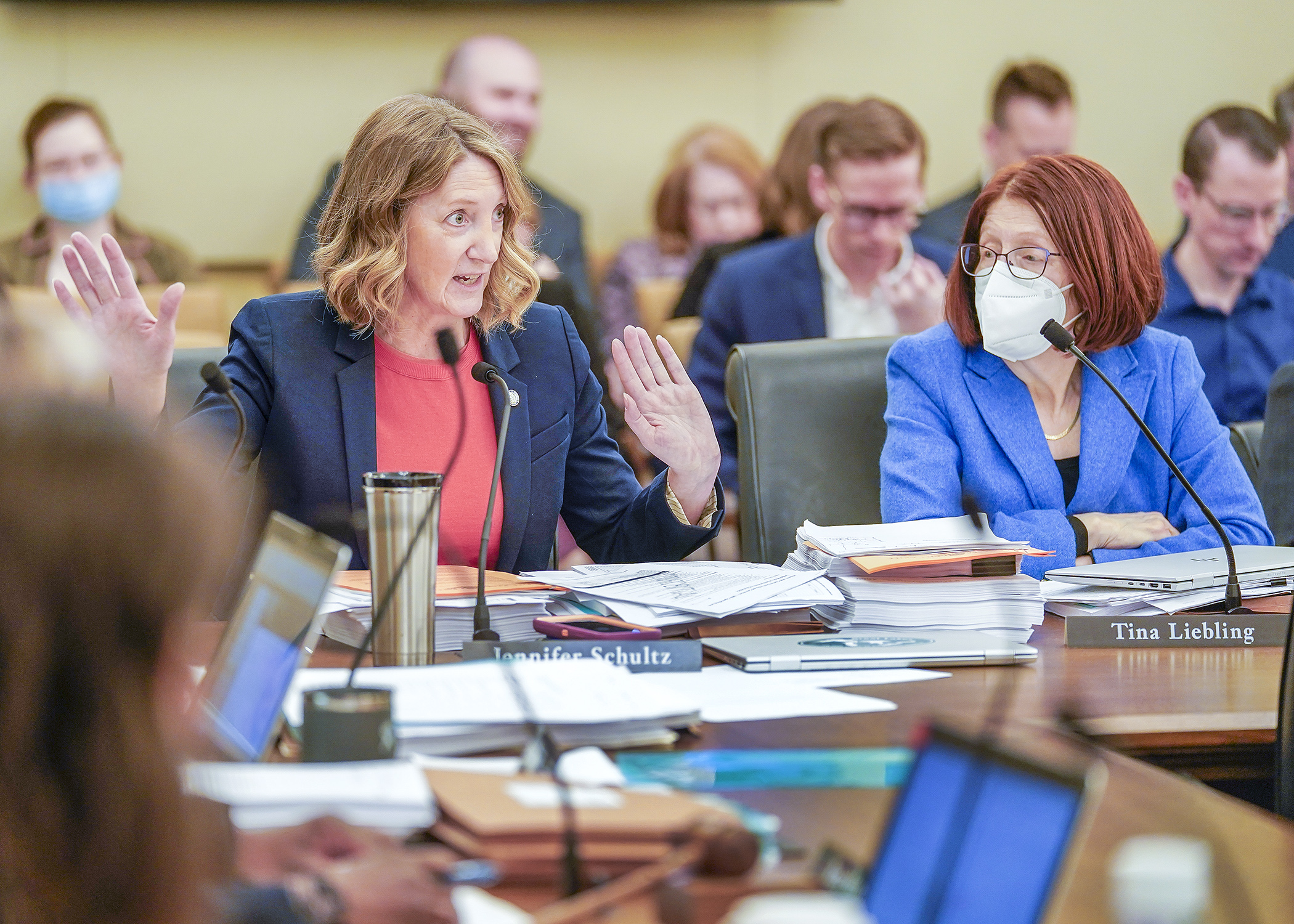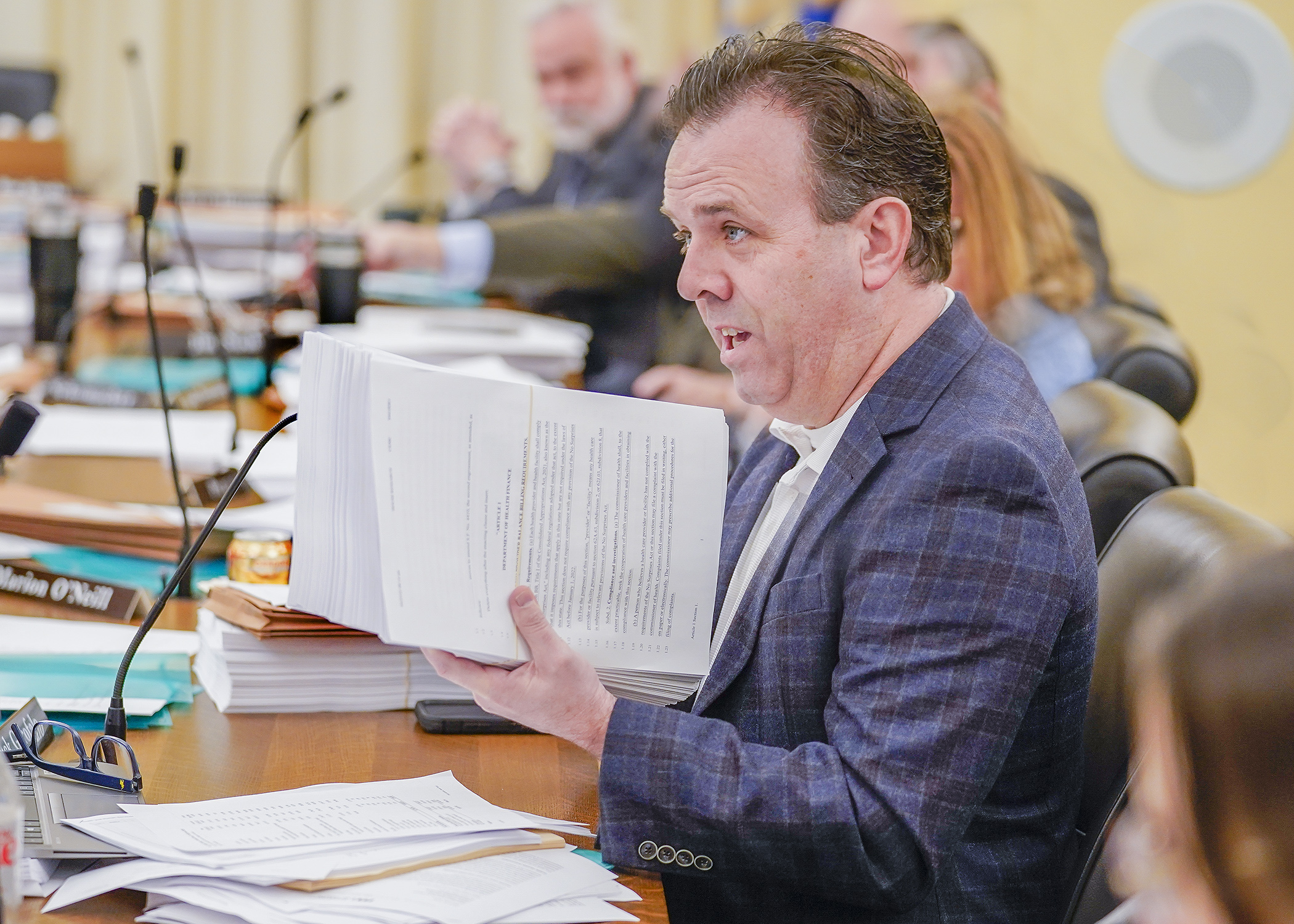Omnibus health and human services supplemental funding bill gains committee approval, moves to House Floor

There’s a new bit of legislative jargon making the rounds to describe the end product of combining omnibus bills — themselves composed of dozens of separate bills — with other omnibus bills.
That term is mega-omnibus bill, and the House Ways and Means Committee approved an 870-page health, human services, and early childhood bill Wednesday and sent it to the House Floor.
It would appropriate $768 million in supplemental funding for the state’s health and human services initiatives and programs.
The committee used three bills as starting points in creating the supplemental funding and policy package:
- Articles 1-4 of the omnibus early childhood bill (HF4735);
- the omnibus human services bill (HF4579); and
- the omnibus health bill (HF4706).
Language from those bills were combined into a single “delete-everything” amendment (that was itself amended), and then adopted to replace the language of SF4410, the Senate’s omnibus health and human services bill.
That total package was then approved on a 15-11 mostly party-line vote. Rep. Gene Pelowski, Jr. (DFL-Winona) was the sole DFL member voting against the bill.
[MORE: List of bills included in the omnibus bill]
Because of the substitution of the House language into the Senate file, a conference committee will likely be needed to work out the significant differences between the new House version of SF4410 and the Senate file, sponsored by Sen. Jim Abeler (R-Anoka), and passed 61-5 by the Senate Tuesday.
Total supplemental spending that would be appropriated in the 2022-23 biennium is $768 million, with $270.7 million going to fund health programs, and $478.7 million for human services and early childhood programs.
[MORE: View the spreadsheet]
Both Republican and DFL members said the bill would go a long way toward meeting the health care and social needs of the most vulnerable Minnesotans, but that more could be done.
Republicans voted against the bill not because they disagreed with spending in it, said Rep. Tony Albright (R-Prior Lake), but only because they had differing priorities on how to do so.
Albright said his side would save those discussions for later.
“There will be more than ample opportunity to discuss the provisions in the bill on the floor and as we move it into [conference] committee,” he said.
Health policy provisions
“This is a bill that helps to position Minnesota for success in the future,” said Rep. Tina Liebling (DFL-Rochester). “We are a great state, but we still have some real serious problems that are going on in our health and human services areas.”
Liebling, sponsor of HF4706 and chair of the House Health Finance and Policy Committee, said health portions of the omnibus bill focus on ways to support the behavioral health workforce, mental health workers, and community health workers, including grants, scholarships, and technical assistance.
Access to health care would also be increased, Liebling said, especially for seniors, people with a disability, and people in historically medically underserved communities.
Notable policy provisions in the bill include those that would:
- improve access to Medical Assistance for people with disabilities by fixing the “spend-down” limit;
- establish loan forgiveness programs for health care workers, including those serving in rural and underserved areas;
- establish a MinnesotaCare public option effective Jan. 1, 2025;
- permit all enrollees to opt out of managed health care plans;
- expand the community health worker workforce;
- fund eight regional drug overdose prevention teams;
- establish a voluntary home visiting program for families expecting or caring for an infant;
- lower patient enrollment fees for the medical cannabis program to $40;
- establish the Emmett Louis Till Victims Recovery Program;
- distribute no-cost COVID-19 tests, masks, and respirators to individuals;
- establish a Health Care Affordability Board authorized to set health care spending growth targets;
- expand adult dental coverage under Medical Assistance;
- establish a dental home pilot project; and
- establish a grant program for remediation of lead sources in drinking water in schools and child care settings.
Human services provisions
Rep. Jennifer Schultz (DFL-Duluth), chair of the House Human Services Finance and Policy Committee, said the omnibus bill makes “historical investments” in human services and reflects the high priority the committee placed on addressing the health care workforces shortages across the state.
Schultz, who sponsors HF4579, said those priorities include increasing pay for personal care assistants, allowing them to be paid when driving clients and removing a 40-hour-per-week limit on paid family caregivers. According to the nonpartisan House Fiscal Analysis Department, the cost would be about $102 million over the next three years.
Pay for personal care assistants, who can help people with disabilities live in the community and the elderly to age in place, has not kept pace with inflation, Schultz said.
“And we still have work to do because there are 13,000 openings,” she said.
 Rep. Pat Garofalo holds up the omnibus health, human services and early childhood bill during discussion of the package in the House Ways and Means Committee April 27. (Photo by Andrew VonBank)
Rep. Pat Garofalo holds up the omnibus health, human services and early childhood bill during discussion of the package in the House Ways and Means Committee April 27. (Photo by Andrew VonBank)The omnibus bill would also encourage participation in the human services workforce through tools such as tuition forgiveness, incentive pay, workforce development grants and increased reimbursement rates on wages paid to personal care assistants.
Additional funds provided to the Department of Human Services would help workflow coming out of the COVID-19 emergency and update its technology systems.
Other provisions in the human services portion of the bill would:
- increase general assistance for single adults for the first time in nearly 40 years;
- expand eligibility for the Supplemental Nutritional Assistance Program;
- address a benefits cliff that prevents some working parents from fully entering the workforce;
- offer grants to allow intensive residential treatment services to offer some secure facilities; and
- expand access to shared services.
Appropriations would include:
- $3 million for children’s mental health services, including first psychosis episodes;
- $2.8 million for grants to allow intensive residential treatment services to offer some secure facilities;
- $2 million for the African American Mental Health Center;
- $1 million for a grant to the Minnesota Association for Volunteer Administration; and
- $750,000 to expand access to shared services.
Behavioral health provisions
Several provisions were heard by the behavioral or preventive health divisions. Some of those would:
- require the Department of Health to contract with a non-profit organization to support comprehensive school-based health centers and to issue grants to help existing centers or establish new ones;
- expand Medical Assistance and MinnesotaCare coverage to include treatment programs, drugs or other services that help people quit smoking or stop using other tobacco and nicotine products;
- establish a mental health provider grant program and a mental health professional scholarship program;
- make mental health professionals who provide clinical supervision in their designated field eligible for loan forgiveness under the health professional education loan forgiveness program;
- allow children referred for mental health crisis stabilization to receive residential treatment services for up to 30 days and be subject to existing screening and admissions criteria for ongoing residential treatment; and
- add interventions for emerging or first episodes of mood disorder and public awareness campaign to the item list for children’s mental health grants.
Early childhood provisions
Rep. Dave Pinto (DFL-St. Paul) said the bill seeks to make child care affordable for low-income families and help child care providers, or what bill supporters say is “the public good.”
It would expand access to affordable child care by broadening the definition of family to include foster care families, relative custodians and successor custodians, and would make permanent some changes that were made to the child care assistance Basic Sliding Fee program during the COVID-19 pandemic to help end the wait listing for families who meet income and other eligibility criteria.
Child care reimbursement rates to providers would increase and a brain builder bonus pilot program created to give incentives to eligible providers who care for infants and toddlers.
The Department of Human Services would be required to develop a cost estimation model for providing early care and learning, and a child care provider wage scale and the bill would also establish grant programs to assist child care providers with technology needs.
Other notable early childhood provisions in the bill would:
- establish a grant program to enable family child care providers to implement shared services alliances;
- require child care resource and referral programs to administer the child care one-stop regional assistance network;
- provide assistance to child care providers and individuals interested in becoming providers;
- provide supports that enable economically challenged individuals to obtain the skills training, career counseling, and job placement assistance necessary to begin a career in child care; and
- provide funding to upgrade IT support to facilitate data sharing across multiple state agencies for programs affecting early childhood.
_____
Session Daily writers Tim Walker, Margaret Stevens, and Pratik Joshi contributed to this report.
Related Articles
Search Session Daily
Advanced Search OptionsPriority Dailies
Ways and Means Committee OKs proposed $512 million supplemental budget on party-line vote
By Mike Cook Meeting more needs or fiscal irresponsibility is one way to sum up the differences among the two parties on a supplemental spending package a year after a $72 billion state budg...
Meeting more needs or fiscal irresponsibility is one way to sum up the differences among the two parties on a supplemental spending package a year after a $72 billion state budg...
Minnesota’s projected budget surplus balloons to $3.7 billion, but fiscal pressure still looms
By Rob Hubbard Just as Minnesota has experienced a warmer winter than usual, so has the state’s budget outlook warmed over the past few months.
On Thursday, Minnesota Management and Budget...
Just as Minnesota has experienced a warmer winter than usual, so has the state’s budget outlook warmed over the past few months.
On Thursday, Minnesota Management and Budget...